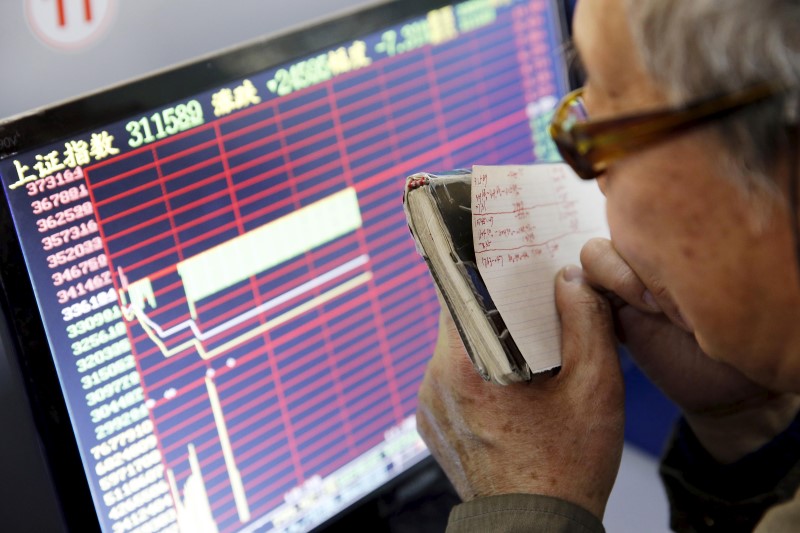By Lu Jianxin and Pete Sweeney
SHANGHAI (Reuters) - China's major stock indexes rose strongly on Friday after Beijing ditched a circuit breaker mechanism that halted trading twice this week and had been blamed for exacerbating the market sell-offs it was designed to limit.
The People's Bank of China also raised its guidance rate for the yuan for the first time in nine trading days, having allowed the currency's biggest fall in five months on Thursday, sending shivers through regional currencies and global stock markets as investors feared it would trigger competitive devaluations.
Chinese markets have had a turbulent start to 2016, buffeted by the PBOC's lower yuan fixings against the dollar, two days of stock exchange suspensions, weak factory and service sector surveys, and worries about looming share sales by major stakeholders once a ban on such sales expires.
With the circuit breaker deactivated late on Thursday, the CSI300 index (CSI300) was up 3 percent at 3,393.61 points in early afternoon trade on Friday, while the Shanghai Composite Index <.SSEC> was up 2.8 percent at 3,211.12 points.
The CSI300 had lost around 12 percent in the first four trading days of 2016, giving up all the gains made in 2015.
The circuit breaker, which only came into effect on Jan. 4, came under fire for kicking in too soon with its initial pause in trading, and then encouraging a rush to sell before a second trigger halted the day's trade permanently.
"The market is back to normal," said Tian Weidong, analyst at Kaiyuan Securities. "Investors can buy and sell as they wish. Under the circuit breaker mechanism, the market was suffocated."
To calm currency markets, the PBOC set its daily midpoint rate for the yuan
The yuan firmed in early trade, with dealers suspecting that the central bank intervened through state-run banks to support its currency, which could help allay fears that any depreciation would be allowed to continue at pace.
The onshore yuan
"While the market was left with uncertainty on how far the yuan will fall, the Chinese central bank's action (the stronger fix on Friday) was taken as a signal that it does not intend to keep allowing the yuan to fall," said Yoshinori Shigemi, a market strategist at JPMorgan (N:JPM) Asset Management.
Sources told Reuters that China's foreign exchange regulator has ordered banks in some trading hubs, including Shenzhen, to limit clients' dollar purchases this month, the latest attempt to stem capital outflows.
Standard Chartered (L:STAN) and DBS Group Holdings Ltd (SI:DBSM) are among three lenders that China's central bank last week suspended from conducting some foreign exchange business, three sources with direct knowledge told Reuters on Thursday.
Sources for an earlier story on cross-border currency dealing said some banks may have been targeted because of the large scale of their cross-border forex businesses.
CALL FOR CLARITY
After its sharply lower fix on Thursday, the PBOC had later sown confusion by reportedly intervening heavily to defend the yuan in offshore trade, reversing a decline of more than 1 percent that took it to a record low of 6.7600 per dollar.
That left dealers at a loss to know what the central bank's aims were. "Market volatility this week suggests that nobody really knows what the policy is right now. Or if the government itself knows or is capable of implementing the policy even if there is one," said DBS bank.
"The market's message was loud and clear, that more clarity and less flip-flopping is needed going forward."
Markets will remain wary of China's currency goals, as mixed messages come from the central bank, which has repeatedly said it sees no basis for the currency to depreciate, while steering it gradually lower.
Sources told Reuters on Thursday that the PBOC is under increasing pressure from policy advisers to let the currency fall quickly and sharply, by as much as 10-15 percent, as its recent gradual softening is thought to be doing more harm than good.
A flurry of Chinese economic data in the coming weeks is likely to show economic activity continued to slow in December, adding to concerns about the outlook for 2016.
